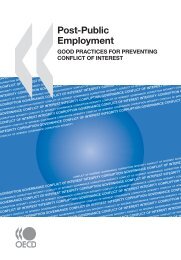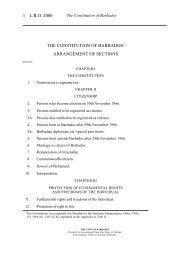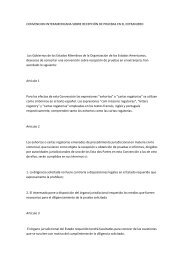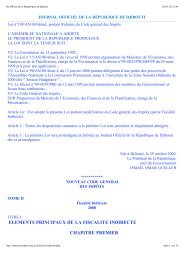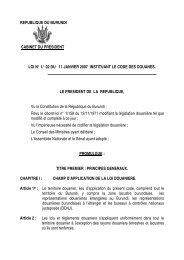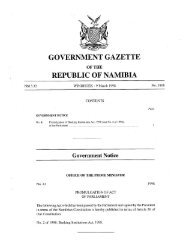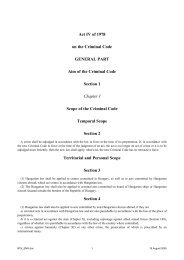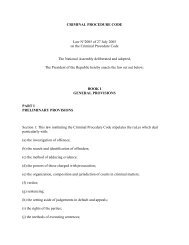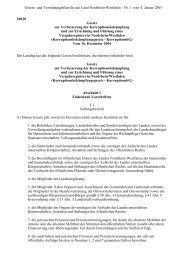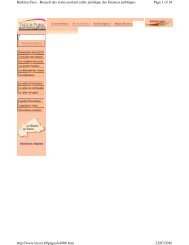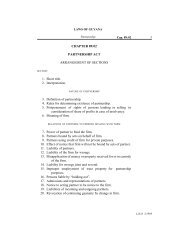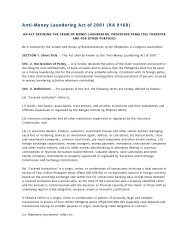Code of Ethics for Civil Servants - On TRACK against Corruption
Code of Ethics for Civil Servants - On TRACK against Corruption
Code of Ethics for Civil Servants - On TRACK against Corruption
You also want an ePaper? Increase the reach of your titles
YUMPU automatically turns print PDFs into web optimized ePapers that Google loves.
Article 9Gifts and other <strong>for</strong>m <strong>of</strong> benefit(1) <strong>Civil</strong> servants shall not ask <strong>for</strong> nor accept, <strong>for</strong> themselves or <strong>for</strong> others,gifts, services, assistance or any other benefit that could affect or that could seemto affect their decisions <strong>for</strong> certain issues, or that could corrupt their pr<strong>of</strong>essionalapproach towards certain issues.(2) <strong>Civil</strong> servants shall not accept gifts or gratitude that could be deemed asreward <strong>for</strong> those activities the per<strong>for</strong>mance <strong>of</strong> which is their responsibility.(3) <strong>Civil</strong> servants shall not ask <strong>for</strong> themselves or <strong>for</strong> other nor shall theyaccept gifts or other <strong>for</strong>m <strong>of</strong> benefit from other civil servant or his/her relative.Article 10Protection and economy usage <strong>of</strong> government funds(1) <strong>Civil</strong> servants shall put all ef<strong>for</strong>ts to ensure maximum effective andeconomy management and usage <strong>of</strong> tangible assets, equipment and other objectsentrusted to them, and shall prevent their illegal disposal.(2) <strong>Civil</strong> servants shall take care <strong>of</strong> undertaking appropriate measures toensure security <strong>of</strong> entrusted objects as well as <strong>of</strong> eliminating the possibilities tocause material damage in the body in which they are employed.Article 11Conduct at the service(1) <strong>Civil</strong> servants, except due to justified causes, shall not postpone orentrust the per<strong>for</strong>mance <strong>of</strong> the activities or the decision making within theirresponsibility to other civil servants. They shall not refuse the per<strong>for</strong>mance <strong>of</strong> the<strong>of</strong>ficial duties <strong>of</strong> the working post assigned to them nor shall reject the orders by thedirect superior civil servant, except in the cases stipulated by law.(2) Respecting <strong>of</strong>fice hours, civil servants shall pay special ef<strong>for</strong>ts and timeto per<strong>for</strong>m the <strong>of</strong>ficial duties. They shall limit absence from their working post tothat strictly indispensable.(3) <strong>Civil</strong> servants shall not use the objects or the equipment at their disposalassigned to them <strong>for</strong> <strong>of</strong>ficial purposes <strong>for</strong> private ones. Except in cases <strong>of</strong>emergency, they shall not use the <strong>of</strong>fice telephone or computer equipment <strong>for</strong>personal needs. <strong>Civil</strong> servants having company vehicle at disposal shall use thevehicle <strong>for</strong> per<strong>for</strong>ming <strong>of</strong>ficial duties and shall not transport persons not within theadministration.(4) <strong>Civil</strong> servants shall conduct correctly towards the other civil servants aswell as the employees in the other state bodies.(5) <strong>Civil</strong> servants shall pay special attention to the way they dress in ordernot to cause an impression <strong>of</strong> indecency or impairment <strong>of</strong> the reputation <strong>of</strong> thebody in which he/she is employed.



